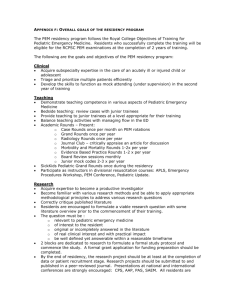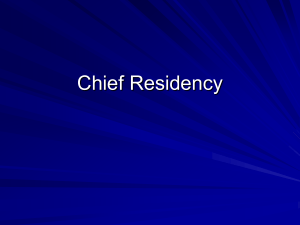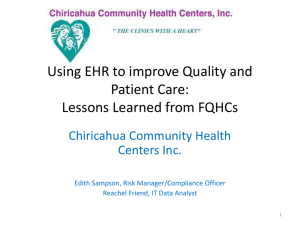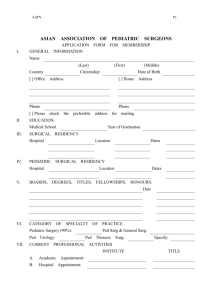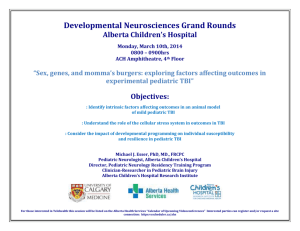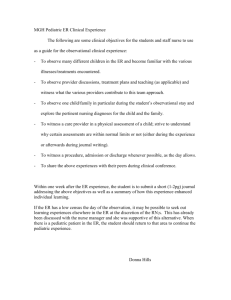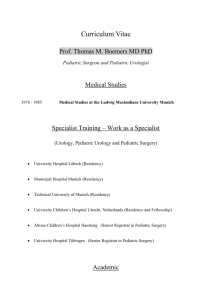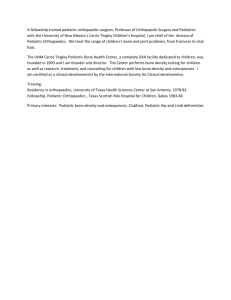Healthy Steps in Pediatric Residency Training Package
advertisement
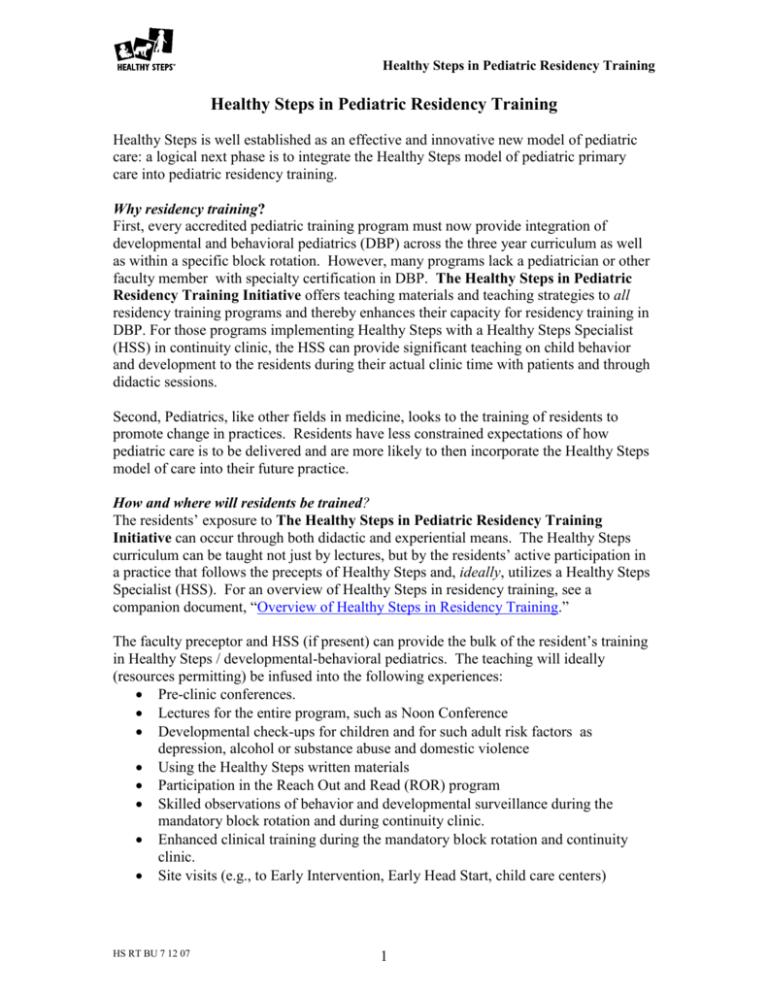
Healthy Steps in Pediatric Residency Training Healthy Steps in Pediatric Residency Training Healthy Steps is well established as an effective and innovative new model of pediatric care: a logical next phase is to integrate the Healthy Steps model of pediatric primary care into pediatric residency training. Why residency training? First, every accredited pediatric training program must now provide integration of developmental and behavioral pediatrics (DBP) across the three year curriculum as well as within a specific block rotation. However, many programs lack a pediatrician or other faculty member with specialty certification in DBP. The Healthy Steps in Pediatric Residency Training Initiative offers teaching materials and teaching strategies to all residency training programs and thereby enhances their capacity for residency training in DBP. For those programs implementing Healthy Steps with a Healthy Steps Specialist (HSS) in continuity clinic, the HSS can provide significant teaching on child behavior and development to the residents during their actual clinic time with patients and through didactic sessions. Second, Pediatrics, like other fields in medicine, looks to the training of residents to promote change in practices. Residents have less constrained expectations of how pediatric care is to be delivered and are more likely to then incorporate the Healthy Steps model of care into their future practice. How and where will residents be trained? The residents’ exposure to The Healthy Steps in Pediatric Residency Training Initiative can occur through both didactic and experiential means. The Healthy Steps curriculum can be taught not just by lectures, but by the residents’ active participation in a practice that follows the precepts of Healthy Steps and, ideally, utilizes a Healthy Steps Specialist (HSS). For an overview of Healthy Steps in residency training, see a companion document, “Overview of Healthy Steps in Residency Training.” The faculty preceptor and HSS (if present) can provide the bulk of the resident’s training in Healthy Steps / developmental-behavioral pediatrics. The teaching will ideally (resources permitting) be infused into the following experiences: Pre-clinic conferences. Lectures for the entire program, such as Noon Conference Developmental check-ups for children and for such adult risk factors as depression, alcohol or substance abuse and domestic violence Using the Healthy Steps written materials Participation in the Reach Out and Read (ROR) program Skilled observations of behavior and developmental surveillance during the mandatory block rotation and during continuity clinic. Enhanced clinical training during the mandatory block rotation and continuity clinic. Site visits (e.g., to Early Intervention, Early Head Start, child care centers) HS RT BU 7 12 07 1 Healthy Steps in Pediatric Residency Training 1:1 supervision with the HSS or preceptor directly observing the resident’s interactions with patients. Co-management of families in continuity clinic with the HSS and/or faculty preceptor What training materials are available ? The Healthy Steps in Pediatric Residency Training Initiative has created teaching “modules” to be used by pediatric faculty and HSS to facilitate training. These “modules” cover 24 topics in child behavior and development for children from birth through age 5. Each module is organized to provide o residents with pre-clinic activities such as exploring a given topic through a website or planned observation, o case-based engagement activities during the lecture such as looking at a brief video clip and discussing the implications for practice, o a Power Point presentation for faculty to use with downloadable parent handouts for distribution, post-conference activities and references. These training materials are designed to be used either in a 30 minute format (e.g., during pre-clinic conference) or in a 60 minute lecture format (e.g., for noon conference or during the nursery or child development rotation of the residency program). The emphasis in each module is on how to build and sustain relationships with families in a busy practice setting. Topics include: 1. Teachable moments in primary care 2. Cognitive development 3. Language and communication development 4. Social-emotional development 5. Gross and fine motor development 6. Child temperament: Promoting “goodness of fit “ 7. Beyond stacking blocks: Developmental surveillance in primary care 8. Behavioral screening in primary care 9. The CLNBAS: Assessing newborn behavior in the nursery 10. Services for children with developmental delays: Early intervention and special education 11. Active children": When to worry 12. Giving bad news 13. Child care 14. School readiness: Is my child ready for kindergarten? 15. Pediatric literacy intervention: Prescribing books in health supervision visits 16. The "colicky" infant 17. Perchance to dream: Sleep and sleep disorders 18. Food, glorious food: Childhood feeding issues 19. Toilet training, Enuresis and Encopresis 20. Beyond time-out: Helping parents with discipline HS RT BU 7 12 07 2 Healthy Steps in Pediatric Residency Training 21. Biting, thumb sucking, bottles & pacifiers, Sibling rivalry & temper tantrums: Toddler behaviors that worry parents 22. Drugs/alcohol, cigarettes, post-partum, depression and domestic violence: Risky business in families 23. Children and the media: Making hard choices 24. Integrating legal advocacy into clinical practice What should I do if interested or would like more information? If you are interested in the Healthy Steps in Pediatric Residency Training Initiative, please contact: Marilyn Augustyn, M.D. at augustyn@bu.edu or Margot Kaplan-Sanoff, Ed.D. at sanoff@bu.edu. HS RT BU 7 12 07 3
